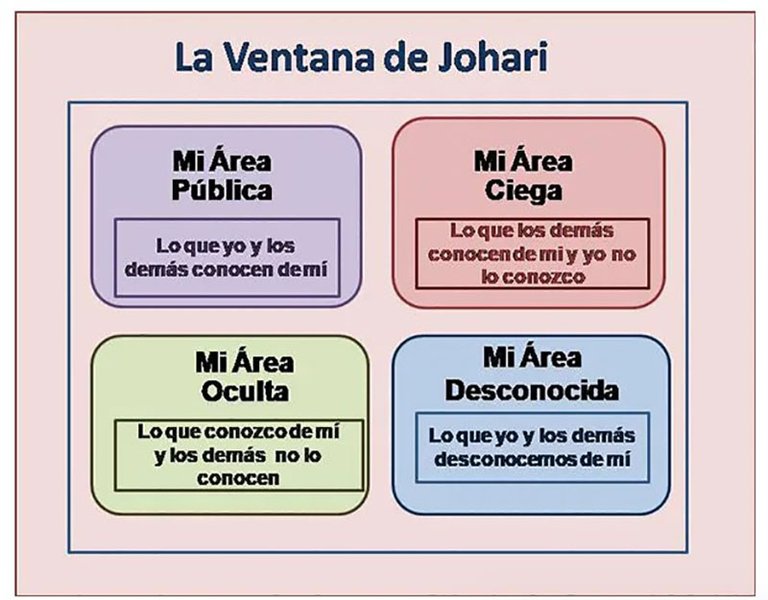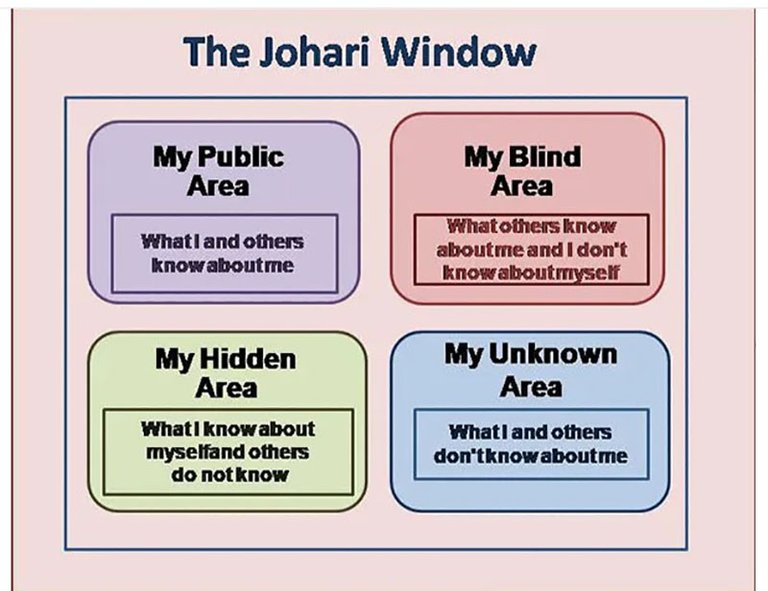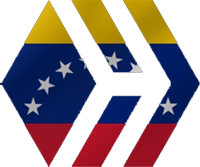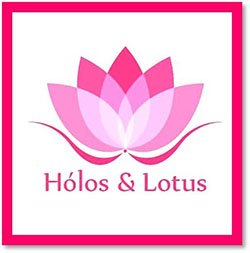El punto ciego del emprendedor||Entrepreneur`s blind spot

El punto ciego es una expresión que posiblemente la hayas escuchado ligada a la conducción de un vehículo, haciendo referencia a esos espacios laterales del vehículo donde no podemos ver todo lo que está a nuestro alrededor, quizás hayamos tenido la experiencia y es un cornetazo el que nos advierte de ese vehículo que nos está pasando, llevándonos un buen susto por no estar completamente atentos.
No deja de ser interesante que algo tan grande como un vehículo y que lo tengamos tan cerca, haya un punto donde no lo podamos ver, pero más interesante es saber que nosotros tenemos nuestros propios puntos ciegos, aspectos nuestros que no conocemos o reconocemos, pero que están allí. Ahondemos un poco en lo que es este punto ciego en nosotros.
Cuando estudie la carrera docente, una de las herramientas que nos presentaron para trabajar el autoconocimiento fue la ventana de Johari, al respecto hace dos años escribí un post Conociéndome Mejor//Getting to Know me Better, hoy lo retomo en uno de sus aspectos y desde la perspectiva del emprendedor.

Como podemos observar en la lámina, la ventana consta de 4 paneles, uno de ellos es la llamada Área ciega o punto ciego, como lo estamos trabajando aquí, ¿Qué es esta área ciega, qué hay allí? Es el área donde los demás ven o conocen cosas de mí que yo conozco. Te doy un ejemplo:
Tengo dos amigas que son “market mavens”, expertas en el mercado local, si requieres de algún producto basta con que las llames y encuentras la respuesta oportuna y veraz. Impresionan por su habilidad para manejar la ubicación del producto, características y precios, además que no deja de sorprenderme su memoria archivadora.
En estos días conversaba con una de ellas y le preguntaba si conocía un producto que es como una fina capa de vinilo para cubrir el fondo de los gabinetes de cocinas con el fin de protegerlos de sucio y manchas. Como ven, no tenía ni el nombre de lo que estaba buscando, solo una descripción de para qué lo quería. Pues me ha dado el nombre de la tienda donde lo podía encontrar, las dos presentaciones en que venían con sus respectivos precios e incluso los colores disponibles.
En varias oportunidades le he dicho que esa es una habilidad excepcional y que puede sacarle provecho, su respuesta: mis hijas opinan lo mismo, no es un talento, es que ustedes son despistadas. Este es el punto ciego: tienes una habilidad, un talento que los demás lo pueden ver, pero tú no.
Así como estas, todos tenemos fortalezas, y como no, también debilidades que no nos vemos, de allí la gran importancia que tiene para el emprendedor el autoconocimiento, pues es a través de este conocimiento que podemos aprovechar al máximo nuestra potencialidad y esforzarnos para transformar aquello que tenemos como limitación.
Conocer nuestros puntos ciegos también nos ayuda a ser más coherentes, alineándonos con lo que decimos, hacemos y las actitudes que tenemos, lo que indudablemente se verá proyectado en nuestra marca personal y en cualquier emprendimiento en el que nos desarrollemos porque a fin de cuentas estamos en interacción constante con el otro que ve aspectos nuestros, que nosotros no podemos ver.
Entonces esa expresión que escuchamos con alguna frecuencia: —No me importa lo que los demás digan o piensen de mí— en el ámbito del emprendimiento y me atrevería a afirmar que en ningún espacio, tiene validez, pues somos imagen de lo que ofrecemos, somos los valores que tengamos.
Descubrir nuestras áreas ciegas. Hay algunas técnicas para conocer nuestra área ciega, una de ella es escuchar atentamente a las personas con las que tenemos interrelación y se suponen que nos conocen más, por lo general, estas personas van soltando expresiones con las cuales nos califican y en ocasiones hasta nos juzgan.
Tomemos notas de esas palabras que dicen quién y cómo somos para reflexionar sobre ello, posiblemente develemos cosas que nos sorprendan.
Hay una más inmediata y efectiva que es solicitar directamente a esas personas: conocidos, amigos, familiares, compañeros de trabajo, miembros de grupos con los que haces vida social, entre otros, que te hagan una retroalimentación, con un planteamiento bien concreto: ¿Dime en dos palabras como soy?
Recoge por lo menos 20 apreciaciones (cuarenta palabras o ideas) haz dos listas: en una anota todas aquellas en las cuales te reconoces, que son lo que tú conoces de ti y los demás también. En la segunda listas coloca las apreciaciones que te sorprenden, las que te dices: yo no soy así o no tengo esta cualidad.
Con las ideas de esta segunda lista es que vas a hacer tu reflexión para profundizar en aquello que los demás ven en ti y que tú no lo ves. Si es positivo posiblemente este sea el momento para desarrollarlo, si es negativo, tal vez sea hora de hacer una revisión y plantearte reorientar el camino.


The blind spot is an expression that you may have heard linked to the driving of a vehicle, referring to those lateral spaces of the vehicle where we can not see everything that is around us, perhaps we have had the experience and it is a bugle that warns us of that vehicle that is passing us, taking us a good scare for not being fully attentive.
It is interesting that something as big as a vehicle and that we have it so close, there is a point where we cannot see it, but more interesting is to know that we have our own blind spots, aspects of ourselves that we do not know or recognize, but that are there. Let's delve a little deeper into what this blind spot is in us.
When I studied the teaching career, one of the tools we were introduced to work on self-knowledge was the Johari window, two years ago I wrote a post about it Conociéndome Mejor//Getting to Know me Better, today I take it up again in one of its aspects and from the perspective of the entrepreneur.

As we can see in the slide, the window consists of 4 panels, one of them is the so-called Blind Area or blind spot, as we are working on it here What is this blind area, what is there? It is the area where others see or know things about me that I know. Let me give you an example:
I have two friends who are "market mavens", experts in the local market, if you require any product you just call them and you find the timely and truthful answer. They are impressive for their ability to manage the location of the product, features and prices, and their filing memory never ceases to amaze me.
These days I was talking to one of them and I was asking her if she knew of a product that is like a thin layer of vinyl to cover the bottom of kitchen cabinets to protect them from dirt and stains. You see he didn't even have the name of what he was looking for, just a description of what he wanted it for. He gave me the name of the store where I could find it, the two presentations in which they came with their respective prices and even the colors available.
On several occasions I have told her that this is an exceptional ability and that she can take advantage of it, her answer: my daughters think the same, it's not a talent, it's that you are clueless. This is the blind spot: you have a skill, a talent that others can see but you cannot.
As well as these, we all have strengths, and of course, also weaknesses that we do not see, hence the great importance of self-knowledge for the entrepreneur, because it is through this knowledge that we can make the most of our potential and strive to transform what we have as a limitation.
Knowing our blind spots also helps us to be more coherent, aligning ourselves with what we say, do and the attitudes we have, which undoubtedly will be projected in our personal brand and in any venture in which we develop because after all we are in constant interaction with the other who sees aspects of us that we cannot see.
So that expression that we hear with some frequency: -I do not care what others say or think of me- in the field of entrepreneurship and I would dare to say that in any space, is valid, because we are the image of what we offer, we are the values we have.
Discovering our blind areas. There are some techniques to know our blind area, one of them is to listen carefully to the people with whom we interact and are supposed to know us better, usually these people are releasing expressions with which they qualify us and sometimes even judge us.
Let's take notes of those words that say who and how we are to reflect on it, possibly we will unveil things that surprise us.
There is a more immediate and effective way, which is to directly ask those people: acquaintances, friends, family, co-workers, members of groups with whom you have a social life, among others, to give you feedback, with a very concrete approach: Tell me in two words how I am?
Collect at least 20 appraisals (forty words or ideas) make two lists: in one write down all those in which you recognize yourself, which are what you know about you and what others know about you. In the second list place the appraisals that surprise you, the ones you say to yourself: I am not like this or I do not have this quality.
With the ideas of this second list is that you are going to make your reflection to deepen in what others see in you and you do not see it. If it is positive, this may be the time to develop it, if it is negative, maybe it is time to review it and consider reorienting your path.

Translated with DeepL.com (free version)
Fuente de imágenes: Creadas en canva y PowerPoint



MIS REDES SOCIALES



 Be Entrepreneur
Be EntrepreneurPosted Using InLeo Alpha



Excelente herramienta! Gracias por compartirla 😊
@tipu curate 8
Upvoted 👌 (Mana: 0/75) Liquid rewards.